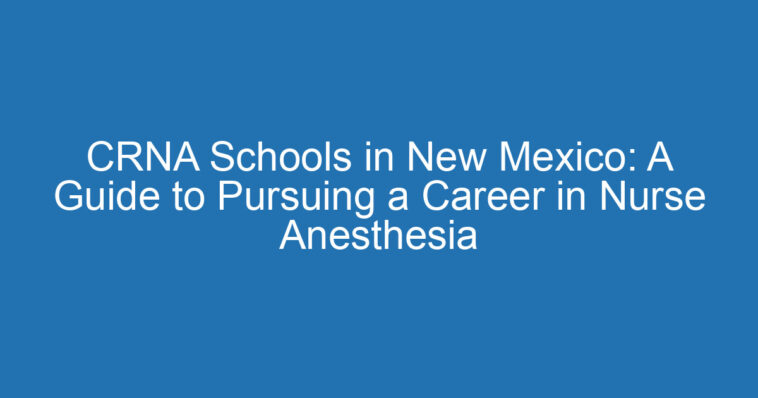If you’re interested in becoming a Certified Registered Nurse Anesthetist (CRNA) and you’re looking for colleges in New Mexico that offer CRNA programs, you’re in the right place.
Becoming a CRNA in New Mexico may require some additional planning and research due to the state having only one in-state CRNA program which is highly competitive and offers limited admission.
In this article, we will provide you with valuable information needed to pursue a Nurse Anaesthesia career in New Mexico and help you make an informed decision about your education and career path.
Understanding the Role of a CRNA
Certified Registered Nurse Anesthetists (CRNAs) are advanced practice registered nurses (APRNs) who specialize in administering anaesthesia to patients during surgical procedures. Nurse Anesthesia is crucial in ensuring patient safety and comfort throughout the pre-operative period.
CRNAs are highly trained professionals who work collaboratively with other healthcare providers to deliver optimal anaesthesia care.
They have the knowledge and skills to perform pre-anaesthetic assessments, administer anaesthesia medications, monitor patients during surgery, and manage post-operative pain.
Why Pursue a Career as A Nurse Anesthetist
Studying a CRNA (Certified Registered Nurse Anesthetist) program can offer several benefits and opportunities. Here are some reasons why you should consider pursuing a career in CRNA:
1. Broad range of practice: As a CRNA, you will have the opportunity to work in various healthcare settings, including hospitals, surgical centers, and clinics. This allows for a diverse and fulfilling career.
2. Autonomy and professional respect: CRNAs are highly trained professionals who work independently in providing anesthesia care. They are respected members of the healthcare team and have a significant role in ensuring patient safety during surgical procedures.
3. High demand: There is a growing demand for CRNAs due to the increasing number of surgeries and the need for anesthesia services. This high demand translates into excellent job prospects and career stability.
4. High earning potential: CRNAs are among the highest-paid nursing professionals. The advanced level of education and expertise they possess allows them to command competitive salaries.
5. Flexible schedules: CRNAs often have the flexibility to choose their work schedules, which can be beneficial for achieving a work-life balance.
6. Meaningful and interesting work: Being a CRNA involves providing anesthesia care to patients during surgical procedures, ensuring their comfort and safety. Nurse Anesthesia is a rewarding and fulfilling career path for those who enjoy making a difference in patients’ lives.
The Importance of Choosing the Right CRNA College
Selecting the right CRNA college is a critical step in your journey toward becoming a nurse anaesthetist. It’s important to consider factors such as graduates’ success, accreditation, clinical experiences, faculty expertise, and curriculum.
Choosing a reputable CRNA college ensures you receive the necessary education and training to excel in your future career.
New Mexico has just one school offering the Nurse Anesthesia Program, and here is everything you need to know about it.
New Mexico State University
New Mexico State University (NMSU) offers a prestigious and comprehensive CRNA program that equips students with the knowledge, skills, and experience necessary to become successful Certified Registered Nurse Anesthetists (CRNAs).
New Mexico State University’s CRNA program is a Doctor of Nursing Practice in Nurse Anesthesiology (DNP-NA) program. It is a highly respected program that prepares students for a rewarding career as CRNAs. The program provides students with a comprehensive understanding of anaesthesia practice, patient safety, and critical thinking skills required to excel in this field.
Curriculum: The curriculum of the CRNA program at NMSU is designed to provide a well-rounded education that combines theoretical knowledge with extensive clinical training.
The program includes didactic, advanced practice nursing courses and over 2000 hours of supervised clinical experience.
The didactic courses cover anaesthesia pharmacology, physiology, anatomy, pathophysiology, and anaesthesia principles.
Clinical experiences are offered in various healthcare settings, including hospitals, surgical centres, and pain management clinics, allowing students to gain hands-on experience and develop their skills under the guidance of experienced CRNAs.
Admission Requirements: Admission to the CRNA program at NMSU is highly competitive. Prospective students must meet the following requirements:
•Hold a Bachelor of Science in Nursing (BSN) from an accredited institution.
•Have a registered nurse (RN) license in New Mexico or be eligible for licensure.
•Have a minimum of one year of critical care nursing experience.
•Submit official transcripts from all previous educational institutions.
•Provide three letters of recommendation from healthcare professionals who can attest to the applicant’s clinical competence and potential for success in the program.
•Submit a personal statement outlining career goals, motivation for pursuing a nurse anaesthesia career, and relevant experiences.
Upon graduation from the CRNA program at NMSU, students are eligible to take the National Certification Examination(NCE) administered by the National Board of Certification and Recertification for Nurse Anesthetists (NBCRNA). Successful completion of the NCE leads to the prestigious title of CRNA and opens doors to a wide range of professional opportunities.
NMSU’s CRNA program is well-regarded in the field of nurse anaesthesia, and graduates have a strong reputation for their clinical competence and professionalism. The program is also committed to fostering research and scholarly activities within the field, providing students with opportunities to contribute to advancing anaesthesia practice through evidence-based research.
CRNA Requirements in New Mexico
To become a CRNA in New Mexico, there are several requirements you must fulfill. These requirements are similar to those in other states and include the following:
- Bachelor’s Degree in Nursing: You will need to obtain a Bachelor’s Degree in Nursing (BSN) from an accredited institution. This degree provides the foundation for your nursing education and prepares you for advanced practice roles.
- Registered Nurse Licensure in New Mexico: After completing your BSN, you must obtain licensure as a Registered Nurse (RN) in New Mexico. This involves passing the National Council Licensure Examination for Registered Nurses (NCLEX-RN) and meeting any additional state-specific requirements.
- Acute/Critical Care Experience: Most CRNA programs require applicants to have a minimum of one year of full-time experience in an acute or critical care setting, such as an intensive care unit (ICU) or emergency department (ED). This experience helps build the necessary clinical skills and knowledge required for advanced anesthesia practice.
- Nurse Anesthesia Educational Program: Once you have gained the required experience, you can apply to an accredited nurse anesthesia educational program. These programs offer the necessary didactic and clinical training to become a CRNA. While New Mexico does has just one in-state program, nearby states like Massachusetts and Maine offer various options.
- National Certification Examination: After completing your nurse anesthesia educational program, you must pass the National Certification Examination (NCE) administered by the National Board of Certification and Recertification for Nurse Anesthetists (NBCRNA). Successful completion of this exam is required to practice as a CRNA.
Considerations for Choosing a CRNA College in New Mexico
When choosing a CRNA college in New Mexico, there are several important factors to consider. These factors include accreditation, faculty expertise, clinical opportunities, and alumni success.
Accreditation is a crucial aspect to consider when selecting a CRNA college. Accreditation ensures that the program meets the highest standards of quality and prepares students for the challenges of the profession. The COA is the accrediting body for nurse anesthesia programs in the United States. It is important to choose a CRNA college that holds accreditation from the COA, as it guarantees that the program meets the necessary educational standards.
Faculty expertise is another vital consideration. Look for colleges that have experienced faculty members who are actively engaged in clinical practice and research. Faculty members with extensive experience in the field can provide valuable insights and mentorship to students, enhancing the learning experience.
Clinical opportunities play a significant role in the education of CRNAs. Look for colleges that provide a wide range of clinical rotations at reputable healthcare institutions. The opportunity to work with diverse patient populations and gain exposure to different clinical settings will greatly enhance your learning and prepare you for the challenges of anesthesia practice.
Alumni success is an important indicator of a college’s reputation and the quality of its program. Research the achievements of alumni from the CRNA colleges you are considering. Find out if they have successfully passed their certification exams and secured desirable employment opportunities. Alumni success can give you confidence in the program’s ability to provide a strong foundation for your future career.
CRNA Career Outlook in New Mexico
The healthcare industry in New Mexico offers various employment opportunities for qualified CRNAs.
To find employment as a CRNA in New Mexico, you can explore job listings on online job boards, healthcare websites, and professional networking platforms.
It’s also beneficial to network with other healthcare professionals, attend industry conferences, and join professional organizations to stay updated on job openings and connect with potential employers.
The average hourly pay for a CRNA job in New Mexico is $122.76 per hour, with a range of $11.43 to $178.81 per hour.
The average salary for a Certified Registered Nurse Anesthetist in New Mexico is $261,822 per year.
New Mexico has a 35% average rate higher than the national average making it a great place to start a career in Nurse Anaesthesia.
Conclusion:
Pursuing a career as a Certified Registered Nurse Anesthetist (CRNA) in New Mexico requires dedication, hard work, and quality education. The CRNA colleges mentioned above offer comprehensive programs that equip students with the knowledge and skills necessary to excel in this field. When choosing a CRNA college, consider factors such as program length, admission requirements, location, and your own career goals. Research each college thoroughly to find the one that aligns with your aspirations.
Remember, pursuing a career as a CRNA requires dedication, hard work, and a genuine passion for providing high-quality anesthesia care to patients. By following the steps outlined in this guide and staying committed to professional growth, you can embark on a rewarding and fulfilling career as a CRNA in New Mexico or any other state.




